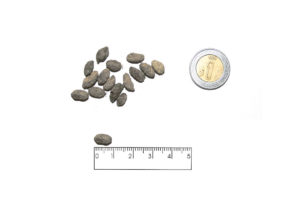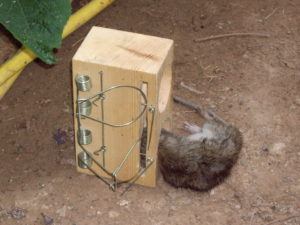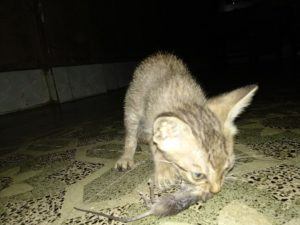If you’ve had chickens for any length of time, you know how much work goes into caring for them. Feed, water, maintaining your coop etc. All of these activities are very important for the overall health of your chickens. Oftentimes, by doing these activities, you’ll prevent any type of rodent infestation altogether!
However…sometimes just keeping your coop tidy isn’t enough to keep out RATS! If you have them, I can tell you from first hand experience (unfortunately) that they are hard to get rid of. Not only that, don’t think because you saw just one rat that you only need to get rid of one rat…where there’s one, there are MANY more.

(Photo by Kapa65, Pixabay)
According to Wikipedia, rats are prolific breeders and the gestation period last only 21 days. The litter size can range up to 14, although up to 7 is more common. And they grow fast, maturing to reproductive age by 5 weeks.
So the “baby rats” can have their very own litter by 8 weeks of age! If you want to do a bit more math on your own, it can be downright scary to think about how many rats can be produced in a matter of weeks, months, or years.
Ok – so I think we’ve established some perspective on the problem. Don’t go burning your chicken coop down though, although you may feel like it if you have a rat infestation…there are ways to get rid of them quickly! We’ll look at a few of the best and more common methods in a bit.
Why Are Rats So Problematic?
On the outside, rats don’t look too intimidating…almost like big mice really. But rats in the wild can create a lot of problems for you and your chickens if not eliminated.
Disease
According the Ontario Ministry Of Agriculture, rats carry up to 45 diseases that can be harmful to either your pets, chickens, or you. A few examples are The diseases can be carried in by way of their feet or droppings, which your chickens are easily exposed to. Also, if they have free access to the chicken feed, they’ll crawl in the container, spreading disease with their urine, hair, or droppings.
Damage To Your Chicken Coop
They have strong, powerful teeth that can allow them gnaw on wood, plastic, or almost anything except metal. If you have chicken feed in the coop and they don’t have easy access, they’ll gnaw a hole in the side of the coop to get at it.
They can also tear up insulation, electrical wiring, and create holes in the floor or siding.
Even if your chicken feed is secured in a plastic container, it may not be enough to keep them out of it – I had a rat problem a few years ago and they ate through part of the plastic container so I switched to a large metal container and that, thankfully, stopped them from accessing the feed.
Feed Expense
The Ontario Ministry of Agriculture estimates that a colony of rats (over 100 rats per colony) can decimate the food supply quickly, eating up to a ton of feed per year! This equals around $25 worth of feed per rat per year.
How to Know If You Have Rats In Your Coop
Beside seeing the rat(s) in the coop or near the coop, you’ll see other signs as well:
- Burrowed holes in the ground going into the coop or shed
- Gnaw marks on the coop or in nearby buildings
- Droppings – these are cylinder shaped and much larger than mice droppings, measuring between 1/4 inch to 1/2 inch (see picture below)
- Smell – if you have a lot of them, a musky type odor will be noticed
- Sounds – depending on your set up, you may hear them rustling around behind walls, under the coop etc.
- Sighting – Rats (and mice) like to come out at night and it’s the best way of seeing them in action. If you go next to your coop at night by a window or, if it’s a large coop, step inside quietly and listen for them scurrying around and use a good light. When we had rats in our barn, there were several sets of eyes in different parts of the barn – it gives me goosebumps just recalling that memory, yuck!
- You’ll see smooth pathways or “runs” along walls where they frequently travel, often in tucked away areas.
How Do I Know If It’s Rat Or Mice In My Coop?
Obviously, mice holes will be much smaller than rat holes. And the size of the droppings is often a dead giveaway as mouse droppings are significantly smaller than rat droppings.

(By Fucesa [CC BY-SA 3.0 (https://creativecommons.org/licenses/by-sa/3.0)], from Wikimedia Commons)
Both rat and mouse droppings are black. But a mouse dropping is roughly the size of a fingernail clipping, a rat dropping is about the thickness of a charging cord for your phone (or even thicker) and about 1/4 to 3/4 inches in length.
How To Get Rid Of Rats
There are several ways to get rid of them. You’ll have to decide which method will work best for you, based on your conscience and beliefs. The list below is by no means exhaustive, but discusses some of the more common, yet effective ways of getting rid of rats!
Poison
There are lot of pros and cons to using poison. It’s convenient and can dispatch a lot of rats in a short amount of time once they find it. However, there are some poisons that can also kill your beloved pets who later eat a rat or mouse that ingested and died from the poison. That’s one reason why poisons can be controversial.
When we had a rat problem, we used a poison we bought at a local farm store. After placing the baits all over the coop area, we kept our cats indoors for a period of time. The poison killed dozens of rats and we spent the next few days getting rid of the carcasses etc. (sorry if this is graphic, but we want you to be prepared if using this method of rat control).
We also did a major clean out of our shed and nearby chicken coop to make it less appealing to any future would-be rat residents. This strategy worked well and we saw no rats after that. Poisons can be bought at your local farm store or online .
Traps
Traps can be very effective as well. There are DOZENS of varieties at your local hardware or farm store, or online that will work great. Do some research from the folks at the farm store as to which traps work best as some will be better than others.

(By Ramon Susqueda [Public domain], from Wikimedia Commons)
We tried traps before switching to poison and some of the traps we used were snapped but the rat was not in it. The trap did not appear large enough or the grip of the jaws did not seem to hold tight enough to hold and kill the rat. Because of this, we switched to poison.
I’m not ruling out traps at all – I did a search online for rat traps and there are a lot of varieties that look A LOT better than what I tried a few years ago. A plethora of rat traps can be found here.
I would advise buying a lot of traps and setting them all over the affected coop or building, but away from where your chickens will walk. The traps can kill the rats…but it can also kill your chickens!
The Bucket Trap
I put this one in it’s own category. I’ve successfully used the bucket trap for catching a lot of mice. And I’ve seen dozens of YouTube videos showing it’s effectiveness for rats as well. It’s great because it’s humane, non-toxic, and you can make it at home for free!
If baited with peanut butter or something irresistible, you may get a lot of rats! Again, I’d supplement this method with another method like poison or other traps to eradicate the colony. Below is video showing how it works. It’s getting so popular now, you can even buy the bucket trap online!
Cats Or Other Predators
I wouldn’t suggest using cats as the sole means of rat control, but they can definitely help reduce the numbers of rats. Other predators could include birds of prey like owls, hawks, snakes, and ferrets. However, except for the cat, it’s not feasible for the average person to access these predators for use in your chicken coop.

By Surajjadhav12345 [CC BY-SA 3.0 (https://creativecommons.org/licenses/by-sa/3.0)], from Wikimedia Commons
Other Ideas…
Glue Traps – Some people suggest glue traps can be effective when placed in the runs of the rats, but by itself, it’s not likely to eradicate the entire colony.
Noise Makers – Some companies make devices that emit ultrasounds which are meant to scare off the rats. I personally don’t recommend this method, but if there is research out there that show it works, I may change my mind!
Ferrets – although many chicken owners have considered letting a ferret loose in their chicken to eradicate the rats, it’s not a good idea!! The ferrets may very well go after much easier prey…your chickens. Ferrets may be effective if you can keep your chickens away from the affected area to let the ferrets work but, to be honest, I’d check out the other methods first.
How To Prevent Rats In Your Chicken Coop
The best way to take care of a rat problem is to make your chicken coop rodent proof BEFORE an infestation occurs. This can be done in a number of simple ways. It’s not to say that you won’t still get the occasional rat from time to time, but it will most decidedly reduce the chances of that happening.
Keep Feed Spillage To A Minimum – Chickens are messy and are bound to make a mess. There are types of chicken feeders that eliminate or greatly reduce feed spillage. More on chicken feeders can be found in this article.
Block Access To Walls or Hidden Spots Where They Could Hide Or Nest – Rats (and mice) love living in walls.

(Photo by Juliana Arruda on Unsplash)
If Possible, Cut Off Easily Accessible Water Supply – We switched from an open water type chicken watering system to using Nipples which only release water when chickens put their beak against the bottom of it. The rats can eventually figure this out as well, but it’s not as convenient as an open water source like a traditional chicken waterer. More on effective, efficient chicken watering systems can be found here.
The nipples can be purchased at your farm store or online. And to see how a bucket waterer is made, see this article.
Keep Feed In A Container With A Lid -A plastic container can be effective, but I’ve seen rats chew through these. Metal containers may be a bit more expensive, but will definitely keep rats out.
Closing Thoughts
I hope you aren’t too grossed out about getting rid of rats in your coop! An unfortunate part of chicken ownership is occasionally having to do nasty jobs like cleaning out the poop…or getting rid of rats and other rodents. Thankfully, there is a lot of information available out there to help you with this.
If you’ve had a rat problem in your coop or have tried any of the above methods, please comment below. We’d love to know what has worked for you. Thanks for stopping by!

